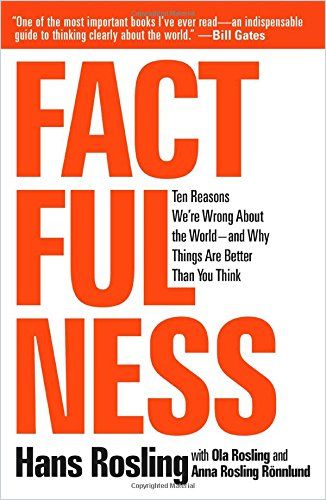Hans Rosling, co-founder of Doctors Without Borders, and his coauthors prove that today’s world is more benign than you would believe.

A Better World
The phrase “reality check” usually implies dashing hope with cold water, but physician and professor Hans Rosling — co-founder of Doctors Without Borders — and his son and daughter-in-law, Ola Rosling and Anna Rosling Rönnlund, believe the world is a safer and more hopeful place than most people think. Throughout the book, the authors’ playful manner brings their statistics to life.
The Roslings fill a crucial contrarian role here. Bill Gates called their overview “one of the most important books I’ve ever read ― an indispensable guide to thinking clearly about the world.”
The authors show how people misguidedly envision a world of extreme violence, deprivation and misery that grows steadily worse. The Roslings reveal statistics indicating that the opposite is true: The world is getting better all the time.
Everyone seems to get the world devastatingly wrong.Hans Rosling, Ola Rosling, Anna Rosling Rönnlund
The authors warn that widespread negative misconceptions generate real-life consequences. For example, the inaccurate belief that the world is divided between extreme poverty and wealth causes some businesses to overlook burgeoning consumer markets in Africa and Asia. These companies miss out on profits and people lose access to goods and medicines that could improve their lives.
Better
Hans Rosling devised a multiple-choice quiz on global conditions that he administered to audiences at his lectures and conferences worldwide. Whether respondents were lay people or policy experts, the majority were wrong about poverty, population growth, the environment and other topics. Their answers reflected beliefs in a more threatening, miserable and ever-worsening world than statistics suggest.
Every group of people I ask thinks the world is more frightening, more violent and more hopeless — in short, more dramatic — than it really is. Hans Rosling, Ola Rosling, Anna Rosling Rönnlund
Data from the World Bank and the United Nations demonstrate that the world is improving. For example, the Roslings point out that 9% of the world’s population lives in extreme poverty, not 50% — as most people believe. Rates of deaths from natural disasters, child mortality, war casualties and hunger have fallen. Childhood vaccination rates, literacy and girls’ access to education all have increased.
The Roslings suggest that negative and incorrect beliefs result from an innate pattern of human thought — the “dramatic instinct.” Evolution cultivated the dramatic instinct to help the brain make snap judgments about possibly dangerous phenomena and respond swiftly. Your brain pays attention to dramatic events — anomalous, extreme and frightening occurrences — because they signal potential threats.
Binary distortions
What the Roslings call the “gap instinct” leads you to categorize people, nations or regions into two distinct groups, with a gap between. They cite the division of the world’s countries into poor “developing” and wealthy “developed” nations. The authors assert that 75% of the world’s population occupies a nation in the middle ground between developing and developed.
Here’s the paradox: The image of a dangerous world has never been broadcast more effectively than it is now, while the world has never been less violent and more safe. Hans Rosling, Ola Rosling, Anna Rosling Rönnlund
The authors offer a more accurate model of four income levels. In Level 1, approximately one billion people live on $1 a day. In Level 2, three billion people make $4 a day and can save money to buy, for example, bicycles or clothing. In Level 3, two billion people live on $16 a day and have running water and electricity. In Level 4, a billion people earn $64 a day.
Dramatic Instincts
Hans Rosling, Ola Rosling and Anna Rosling Rönnlund caution against instincts that lead you to assume the worst. For example, when your brain is influenced by the fear instinct, it focuses on frightening things. But improved preparation and responses to fearful natural disasters have led to fewer deaths from earthquakes and floods, while military conflicts and resulting casualties are at a historic low, though you may note that this book predates Russia’s invasion of Ukraine and the catastrophic earthquake in Turkey and Syria in early 2023.
The size instinct urges you to focus on numbers in isolation, without context. The authors suggest applying division to analyze certain numbers. For example, dividing a country’s total emission number by population reveals the more meaningful per-person pollution rate.
The generalization instinct describes how the brain’s tools of categorization and generalization can distort your perception. The destiny instinct leads some people to ascribe problems to the “innate characteristics” of local people, cultures or religions. This thought process erroneously suggests, for example, that poor countries will always stay poor. The single perspective instinct drives people to seek a single cause and a single solution to complex problems. To see complexity, the Roslings suggest, you must consider facts and opinions that contradict your viewpoint.
Human beings have a strong dramatic instinct toward binary thinking, a basic urge to divide things into two distinct groups, with nothing but an empty gap in between. Hans Rosling, Ola Rosling, Anna Rosling Rönnlund
The blame instinct might lead you to think ill thoughts of journalists, businesspeople or immigrants. Stimulating a fear response — the urgency instinct — interferes with logical thinking and encourages you to take rash actions that produce unintended consequences.
Find Facts
In the five years after the 2008 economic crash, the Roslings note, Level 4 countries failed to meet financial growth expectations. Meanwhile, growth in such Level 2 countries as Ghana and Bangladesh exceeded 5%. Retirement funds kept investing in Level 4 countries, hoping predicted growth rates would materialize. These funds underperformed, but countries with genuine potential for growth received little investment. The Roslings urge you to cultivate an accurate worldview by seeking information in databases. For example, The World Bank and the United Nations make data freely available online. You can track the metrics of any nation’s progress at www.gapminder.org/tools.
Positive Geeks
The co-authors prove to be statistics and policy geeks with hearts of gold. Their analytical view of the world includes a profound belief in human potential and progress. They oppose irrationality, which might explain their work’s consistent best-selling status. You may find relief in reading the insights of generalist experts with no ideological bent except the worship of the truth. Even more incongruous, the Roslings are superb prose stylists, and their dense, indispensable tome is fun to read. Leaders, activists, policymakers, teachers and students will benefit from their eye-opening worldview.
When we are afraid and under time pressure and thinking of worst-case scenarios, we tend to make really stupid decisions. Hans Rosling, Ola Rosling, Anna Rosling Rönnlund
Hans Rosling and Dr. Anna Paterson also wrote How I Learned to Understand the World. Other useful works that demonstrate why you might be wrong about the world include I Hear You by Michael S. Sorenson; Think Again by Adam M. Grant; Burnout by Emily Nagoski; and Sapiens by Yuval Noah Harari.










